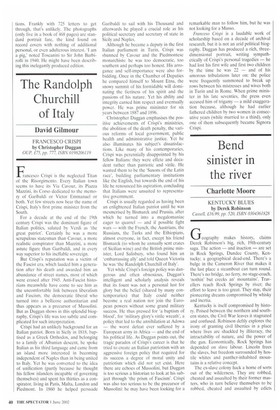The Randolph Churchill of Italy
David Gilmour
FRANCESCO CRISP! by Christopher Duggan OUP, 175, pp. 777, ISBN 0198206119 Francesco Crispi is the neglected Titan of the Risorgimento. Every Italian town seems to have its Via Cavour, its Piazza Mazzini, its Corso dedicated to the memory of Garibaldi or Victor Emmanuel or both. Yet few streets now bear the name of Crispi, Italy's first prime minister from the South.
For a decade at the end of the 19th century Crispi was the dominant figure of Italian politics, saluted by Verdi as 'the great patriot'. Certainly he was a more scrupulous statesman than Cavour, a more realistic conspirator than Mazzini, a more astute figure than Garibaldi, and in every way superior to his ineffable sovereign.
But Crispi's reputation was a victim of the Fascist era, which lauded him a generation after his death and awarded him an abundance of street names, most of which were erased after 1945. Anti-Fascist historians meanwhile have come to see him as the uncomfortable link between liberalism and Fascism, the democratic liberal who turned into a bellicose authoritarian and thus appears as a precursor of Mussolini. But as Duggan shows in this splendid biography, Crispi's life was too subtle and complicated for such interpretation.
Crispi had an unlikely background for an Italian patriot. Born in Sicily in 1818, baptised as a Greek Orthodox, and belonging to a family of Albanian descent, he spoke Italian as his third language and came from an island more interested in becoming independent of Naples than in being united to Italy. Yet he was converted to the idea of unification (partly because he thought his fellow islanders incapable of governing themselves) and spent his thirties as a conspirator, living in Paris, Malta, London and Piedmont. In 1860 he helped persuade Garibaldi to sail with his Thousand and afterwards he played a crucial role as his political secretary and secretary of state in Sicily and Naples.
Although he became a deputy in the first Italian parliament in Turin, Crispi was shunned by Cavour and the Piedmontese monarchists: he was too democratic, too southern and perhaps too honest. His arro gance and self-importance were also for bidding. Once in the Chamber of Deputies he compared himself to Mount Etna, the snowy summit of his formidable will domi nating the fieriness of his spirit and the passions of his nature. Yet his ability and integrity earned him respect and eventually power. He was prime mininster for six years between 1887 and 1896.
Christopher Duggan emphasises the positive achievements of Crispi's ministries, the abolition of the death penalty, the vari ous reforms of local government, public health and administrative justice. Yet he also illuminates his subject's dissatisfac tions. Like many of his contemporaries, Crispi was perennially disappointed by his fellow Italians: they were effete and deca
dent rather than patriotic and virile. Ile wanted them to be the 'Saxons of the Latin
race', building parliamentary institutions like the English, but towards the end of his life he renounced his aspiration, concluding that Italians were unsuited to representative government.
Crispi is usually regarded as having been an enlightened Italian patriot until he was mesmerised by Bismarck and Prussia, after which he turned into a megalomaniac eager to quarrel — and if possible fight wars — with the French, the Austrians, the Russians, the Turks and the Ethiopians, almost everyone, in fact, except his friend Bismarck (to whom he annually sent crates of Sicilian wine) and the British prime minister, Lord Salisbury, who found him an 'embarrassing ally' and told Queen Victoria he was 'the Randolph Churchill of Italy'.
Yet while Crispi's foreign policy was dangerous and often obnoxious, Duggan's intelligent and scholarly analysis reveals that its fount was not a personal lust for glory but the belief (shared by many con temporaries) that Italy could neither become a real nation nor join the European powers without some grand military success. He thus pressed for 'a baptism of blood', for 'military glory's virile wreath', a policy that led to the annihilation at Adowa — the worst defeat ever suffered by a European army in Africa — and the end of his political life. As Duggan points out, the tragic paradox of Crispi's career is that he tried to create an Italian patriotism with an aggressive foreign policy that required for its success a degree of moral unity and patriotism which did not yet exist. Here there are echoes of Mussolini, but Duggan is too serious a historian to look at his subject through 'the prism of Fascism'. Crispi was also too serious to be the precursor of Mussolini: he may have been looking for a remarkable man to follow him, but he was not looking for a Musso.
Frances° Crispi is a laudable work of scholarship based on a decade of archival research, but it is not an arid political biography. Duggan has produced a rich, threedimensional portrait, writing sympathetically of Crispi's personal tragedies — he had lost his first wife and first two children by the time he was 22 — and of his amorous tribulations later on: the police were frequently summoned to break up rows between his mistresses and wives both in Turin and in Rome. When prime minister in his late seventies, the press even accused him of trigamy — a mild exaggeration because, although he had earlier fathered children by two women in consecutive years (while married to a third), only one of them subsequently became Signora Crispi.






































































 Previous page
Previous page